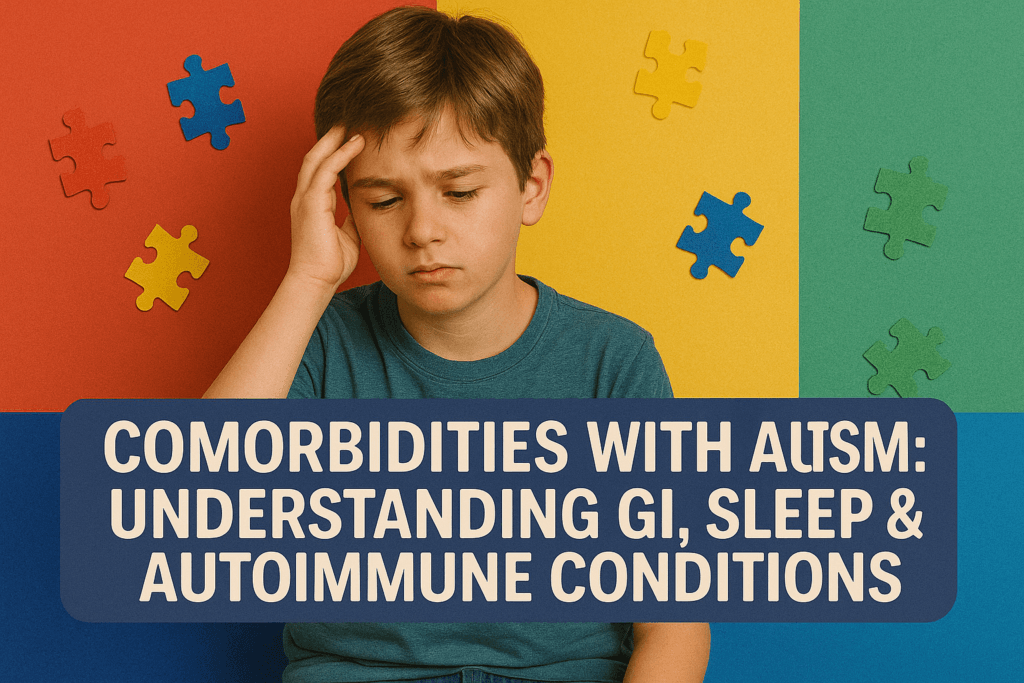🌟 Introduction
Autism spectrum disorder (ASD) is a complex neurodevelopmental condition. But often, the challenges don’t end there. Many individuals with autism also face additional medical and psychological issues—these are called autism comorbidities. These co-occurring conditions can significantly affect the quality of life and require specialized care alongside autism therapies.
In this in-depth guide, we’ll explore the most prevalent autism comorbidities—specifically gastrointestinal (GI) disorders, sleep issues, and autoimmune conditions. We’ll also provide tips, treatment options, and insight into what families, caregivers, and educators can do to help.
🧠 What Are Autism Comorbidities?
The term comorbidity refers to the presence of one or more additional conditions co-occurring with a primary condition. In the case of ASD, comorbidities are incredibly common. Research shows that over 70% of individuals with autism have at least one additional medical or psychiatric condition.
Some of the most common autism comorbidities include:
- Gastrointestinal (GI) disorders
- Sleep disturbances
- Autoimmune disorders
- Epilepsy
- ADHD
- Anxiety and depression
- Sensory Processing Disorder
- Intellectual Disability
- Motor difficulties
In this article, we’ll focus on the first three—GI, sleep, and autoimmune disorders—as they are often underdiagnosed and yet have a significant impact on day-to-day functioning.
🩺 1. Gastrointestinal Disorders in Autism
🚨 Prevalence and Impact
GI issues are among the most frequently reported autism comorbidities. Studies suggest that up to 70% of autistic children experience some form of GI distress.
Common symptoms include:
- Chronic constipation
- Diarrhea
- Abdominal pain
- Acid reflux
- Bloating and gas
- Food intolerances
These symptoms not only cause physical discomfort but can exacerbate behavioral symptoms. For instance, a child in pain might exhibit more self-injurious behavior, meltdowns, or aggression.
🔍 Why Are GI Issues So Common in Autism?
The reasons are multifaceted:
- Neurological differences: The gut is sometimes called the “second brain.” Autistic individuals often have altered gut-brain communication.
- Dietary habits: Selective eating and sensory sensitivities may lead to poor nutrition or restricted diets.
- Immune system involvement: Inflammation in the gut is often observed in autistic individuals.
🩹 Management Strategies
- Dietary interventions: Gluten-free, casein-free diets have shown improvement in some children.
- Probiotics: These can help balance gut bacteria.
- Fiber and hydration: Improve bowel regularity.
- Medical tests: Always consult a GI specialist for chronic issues.
🌙 2. Sleep Disorders in Autism
😴 Why Sleep Matters
Sleep is critical for cognitive function, emotional regulation, and physical health. Unfortunately, between 40% to 80% of people with autism suffer from sleep disorders, making it one of the most difficult autism comorbidities to manage.
Common problems include:
- Difficulty falling asleep
- Night waking
- Restless sleep
- Sleep apnea
- Circadian rhythm disruption
🔄 How Poor Sleep Impacts Autism
Lack of proper sleep can:
- Increase anxiety and aggression
- Lower attention span and academic performance
- Weaken the immune system
- Exacerbate repetitive behaviors and meltdowns
🌜 Solutions and Sleep Hygiene Tips
- Routine: Set a consistent bedtime and wake time.
- Screen-Free Time: Avoid screens at least 1 hour before bed.
- Melatonin: With pediatrician approval, melatonin supplements can aid sleep.
- Comfort: Use sensory-friendly bedding or weighted blankets.
- White Noise: Machines can help calm auditory sensitivities.
🛡️ 3. Autoimmune Disorders in Autism
🔄 What Are Autoimmune Disorders?
These occur when the body’s immune system mistakenly attacks its own tissues. Surprisingly, autoimmune conditions are increasingly being recognized as common autism comorbidities.
Examples include:
- Type 1 Diabetes
- Celiac Disease
- Lupus
- Rheumatoid Arthritis
- PANDAS (Pediatric Autoimmune Neuropsychiatric Disorders Associated with Streptococcal Infections)
🧬 The Link Between Autism and Autoimmunity
Several studies have pointed to:
- Genetic overlaps: Families with histories of autoimmune disorders often have higher instances of autism.
- Inflammatory markers: Many autistic individuals show elevated levels of immune inflammation.
- Maternal immunity: Autoimmune activity in pregnant mothers may influence neurodevelopment.
🧪 Diagnosis and Management
Autoimmune disorders can be difficult to diagnose in non-verbal or young autistic individuals. Symptoms like joint pain, fatigue, and fever may go unreported.
Best practices include:
- Routine blood work
- Food allergy testing
- Specialized pediatric rheumatology consultations
- Anti-inflammatory diets
- Omega-3 supplements
🧩 Integrative Approach to Autism Comorbidities
Autism treatment should never be “one-size-fits-all.” Recognizing and managing comorbidities is key to improving life quality. A multidisciplinary team often provides the best outcomes:
| Specialist | Role |
|---|---|
| Pediatrician | General health & development |
| Gastroenterologist | GI disorders |
| Sleep specialist | Insomnia, apnea |
| Neurologist | Seizures, motor issues |
| Psychologist | Anxiety, depression |
| Nutritionist | Diet, feeding therapy |
| Occupational Therapist | Sensory & motor support |
🧘 Holistic Therapies That Support Comorbidities
Here are some complementary practices gaining traction:
- Yoga and mindfulness: Reduces anxiety and improves sleep.
- Aquatic therapy: Helps with motor coordination and relaxation.
- Nutritional therapy: Addresses GI and autoimmune problems.
- Cognitive Behavioral Therapy (CBT): Especially for anxiety and sleep.
📚 Real Stories & Voices
🔸 “I had no idea my son’s constant meltdowns were due to tummy pain until we saw a GI specialist. Once we treated the constipation, he became calmer and started sleeping better too.” — A Mother from Texas
🔸 “My daughter has autism and lupus. It was a battle to get both diagnoses, but now she’s thriving with a tailored treatment plan.” — Father from California
❤️ Support Autism Wings Inc.
At Autism Wings Inc., we believe in creating holistic support systems for children with autism—including nutritional education, therapy, and soon, a dedicated school!
We’re currently raising funds to build a specialized Autism School that nurtures every aspect of development. Your contribution can change lives.
👉 Donate Now

